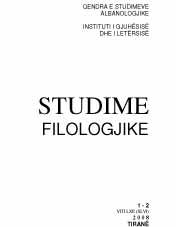Linjat e konfliktit në poemën “Lahuta e Malcis” dhe problemi i keqinterpretimit të qëndrimit atdhetar të Fishtës në të
Lines of the conflict in “The Lute of the Mountains” and the problem of misinterpretation of Fishta’s patriotic attitude in it
Author(s): Muharrem JakupiSubject(s): Language and Literature Studies
Published by: Qendra e Studimeve Albanologjike
Keywords: Lines of the conflict ; The Lute of the Mountains; problem of misinterpretation ; Fishta’s patriotic attitude ; Fishta; Albania; Albanian Literature
Summary/Abstract: This work is built as a discussion about the evaluation on the book Historia e letërsisë shqiptare (History of Albanian Literature), an edition of the Academy of Sciences of People’s Socialist Republic of Albania, in which the poem Lahuta e malcis (Lute of the mountains) of Gjergj Fishta is appraised as anti-Slavic propaganda. Contrary to such thesis there is still no argumentum in this discussion even though this thesis id not founded in the text of the poem. The official policy of the Albanian state at the beginning of the 80s was no more pro-Slavic, but such of an evaluation aimed at the undoing of Fishta’s personality and at the same time the desecration of the poems values, which even censured, still came about as a ghost of a myth. Leaving aside the historical analysis of real events that are wreathed with fictional episodes of the subject, we are concentrated on the analysis of aesthetical aspects that illuminate the attitude of the poem towards chauvinism. Through this interpretive act we hope to have argued that to chauvinism of neighboring Montenegrins, the poem does not respond in any line or stream of consciousness that can transmit chauvinistic pathos by the Albanian counterpart. On the contrary, the objective spirit and upper ethics of the poet makes even the defending war virtues poeticized and also the heroism of Montenegrins when this population does have high values of freedom and fights for defending itself from ottoman invaders. But, when they make invading warfare against Albanians, the poet discovers decisively their chauvinism and places them in the same plan of hatred and negative evaluation as the ottomans. Our thesis argument has been based on a number of illustrations taken from the text.
Journal: Studime Filologjike
- Issue Year: 2008
- Issue No: 01-02
- Page Range: 017-036
- Page Count: 20
- Language: Albanian

